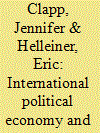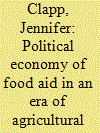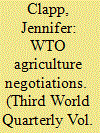| Srl | Item |
| 1 |
ID:
090211


|
|
|
|
|
| Publication |
2009.
|
| Summary/Abstract |
Most official analyses of the recent food price crisis have focused on the market fundamentals of supply and demand for food as key explanatory factors. As a result, most of the policy recommendations emanating from the major international institutions include measures to boost supply and temper demand. In this paper I argue that international macroeconomic factors played a key role in fostering both price volatility and vulnerability, and as such they need to be recognised. With respect to the recent price volatility, the weak US dollar and speculation on agricultural commodities futures markets greatly influenced agricultural prices. With respect to price vulnerability, global economic forces played an important role in dampening production incentives in the world's poorest countries over the past 30 years, leading to a situation of food import dependence. Policy responses to the food crisis must consider the role of these broader international macroeconomic forces-both in the immediate context and their longer term impact.
|
|
|
|
|
|
|
|
|
|
|
|
|
|
|
|
| 2 |
ID:
112801


|
|
|
|
|
| Publication |
2012.
|
| Summary/Abstract |
For the past two decades, scholars of international political economy and the environment (IPEE) have become quite focused on the study of various international cooperative initiatives that seek to link economic and environmental issues in the wake of the 1987 Brundtland Report and the 1992 Rio Earth Summit. This important work has enhanced our understanding of topics such as the economic dimensions of international environmental governance, the environmental activities of international economic institutions and regimes, and new kinds of private international regimes governing the environment-economy interface. This focus of IPEE scholarship has, however, steered attention away from larger structural trends in the international political economy, whose environmental implications are not addressed explicitly by significant international governance arrangements. Three such trends that are deserving of more attention from IPEE scholars include: the globalization of financial markets; the rise of newly powerful states such as China and India in the global economy; and the recent emergence of high and volatile commodity prices. Each of these structural trends-as well as their interrelationships-have important environmental consequences whose closer study enhances our understanding of the relationship between the international political economy and the environment. Their study also encourages scholars to widen their focus beyond treaties, institutions and regimes to examine broader global economic structures and processes, and the power relationships within them, in an interdisciplinary manner that can draw inspiration from the pioneers of the field of international political economy from the 1970s.
|
|
|
|
|
|
|
|
|
|
|
|
|
|
|
|
| 3 |
ID:
066779


|
|
|
| 4 |
ID:
130255


|
|
|
|
|
| Publication |
2014.
|
| Summary/Abstract |
This paper probes some of the global economic forces that have contributed to the ongoing precarious global food security situation, especially in the years since the 2007 to 2008 food crisis. Since the crisis hit at a time when global food production per capita was rising, it is important that policies addressing hunger incorporate dimensions beyond food production. There has been some acknowledgement of the role of global economic forces in the food crisis by global policymakers, but global food security initiatives still largely emphasize increased food production over other measures. The paper concludes that more needs to be done to ensure that the rules that govern the global economy--especially those regarding international trade, finance, and investment--do not work against the goal of food security.
|
|
|
|
|
|
|
|
|
|
|
|
|
|
|
|
| 5 |
ID:
075083


|
|
|
|
|
| Publication |
2006.
|
| Summary/Abstract |
The Doha 'Development' Round of trade negotiations at the wto has featured agricultural trade liberalisation as one of its key aims. But developing countries were frustrated with both the process and the content of the agricultural agreement negotiations early on in the round. This prompted these countries, through a number of developing country groupings such as the G-20 and others, to call for changes in the talks to ensure that developing country voices and concerns were heard. Although developing countries were in many ways successful in registering their concerns in the latter half of the negotiations, and have maintained a fairly high degree of cohesion across the Global South, it remains unclear whether this cohesion will last as the uneven impacts of agricultural trade liberalisation become apparent.
|
|
|
|
|
|
|
|
|
|
|
|
|
|
|
|